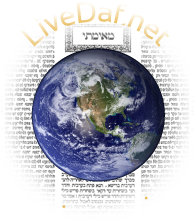Click here to view text of Daf (can be minimized to view alongside video)
Today’s Daf Yomi Question:
If one merely writes ‘Shem’ out of the word ‘Shimon’ he is chayav. Why would this not be considered a Davar she’ino miskaven – since his intention was to write the complete word ‘Shimon’?
The Gemara was looking for a case where he forgot about the 39 melachos, but he is still regarded as knowledgeable about Shabbos. Why can’t we say that the basic awareness that there is a concept of forbidden melachos on Shabbos is sufficient (although not specifically these 39) to deem him knowledgeable about Shabbos?

Not at all a Davar She’eino Mischavein! He had in mind every drop of ink that went into that ‘Shem’. If the Kasha is that it is not Maleches Machsheves, being that his Kavana is not fulfilled until the word is done, would you ask the same about building a house? The Gemara later, on the bottom of Daf 97b, discusses this somewhat more. His long term goal includes some smaller accomplishments that are Chashuv enough in their own right and are therefore a Melacha, much the same as Osse Shtei Batei Nirin and sewing two stitches.
Maleches Machsheves comes in to play when your accomplishment is not what you had in mind to accomplish. For example, if you wanted to get something in one place and it landed in another, or you wanted to sew one item and ended up sewing a different one.
The second Kasha is somewhat similar to Tosafos’ Kasha on Daf 69, where he asks about what if the person knows of the Mitzvas Assei to rest. A possible approach is that this is a case of mistaken identity. If a person thinks that building is permitted on Shabbos but buying and selling or carrying heavy items are prohibited Mide’oraysa than he is not Yodea Ikkar Shabbos. He knows of some other Mitzva, not Shabbos.
The idea of Shigegas Shabbos bringing only one Korban Chatos is that there is essentially one mistake he is making. In this case, where he doesn’t comprehend that Shabbos means not to do these types of Melachos, he is making that same fundamental error.
To understand this better, although we learn the Melachos from the Mishkan, they are not arbitrary tasks. They cover practically anything. We had a discussion earlier on Daf 49b if we learn the Melachos from the Mishkan or we counted up 39 Melachos. Although Tosafos there found it hard to believe that the Avos and Toldos can be sorted out without consulting the Mishkan, he had no hard time with the idea that we can figure out what should be considered a Melacha in the first place.
(The only Kasha he had was from Maavir and Moshit which we see that the Gemara had to learn them from the Mishkan. Even this can perhaps be answered that this is only now that we are not judging on our own, so we have to find it in the Mishkan, but had we been using our own judgement we could have added that in as well, especially after the Pasuk describes Hotza’a as a Melacha as Tosafos in the beginning of the Masechta wrote.)
Therefore, being that the Melachos are of a certain type — they basically define anything that can be considered a task of creating or forming — if someone is missing some of them he still has the concept of what the Issur of Shabbos consists of. However, if someone is missing all of them he is out of the ballpark.
Even Tosafos on Daf 69 who asks about one who is aware of the Assei, is asking that the person knows of the Melachos but thinks they are an Assei. Our case is worse, since he doesn’t know of the Issur at all.
How does shmuel darshan heyna mehayna? And achas meachas?
Rashi explains that Shmuel uses drasha of the passuk (achas/heyna) exclusively for ‘me’achas’ (Shem M’shmuel) and ‘me’hayna’ (for Toldos) and therefore he considers the passuk unavailable for the other drasha (single/many).
Rabbi,
what is special about kindling that makes it a malachah of mere prohibition but not subject to capital punishment?
I haven’t seen any explanation offered on this. Perhaps it may be suggested that kindling a fire is not considered an accomplishment on par with the other melachos. A flame is only created temporarily for the task at hand (cooking, illuminating etc.) and lacks the enduring value of other melachos.